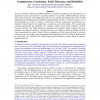Free Online Productivity Tools
i2Speak
i2Symbol
i2OCR
iTex2Img
iWeb2Print
iWeb2Shot
i2Type
iPdf2Split
iPdf2Merge
i2Bopomofo
i2Arabic
i2Style
i2Image
i2PDF
iLatex2Rtf
Sci2ools
CBSQ
2003
Springer
2003
Springer
Assessment of High Integrity Software Components for Completeness, Consistency, Fault-Tolerance, and Reliability
The use of formal model based (FMB) methods to evaluate the quality of the components is an important research area. Except for a growing number of exceptions, FMB methods are still not really used in practice. This chapter presents two case studies that illustrate the value of FMB approaches for developing and evaluating component-based software. In the first study, Z (or Z) and Statecharts are used to evaluate (a priori) the software requirement specification of a Guidance Control System for completeness, consistency and fault-tolerance. The second study evaluates (post-priori) the reliability of a complex vehicle system using Stochastic Activity Networks (SANs). The FMB framework presented here provides further evidence that such methods can indeed be useful by showing how these two different industrial strength systems were assessed and the results. Clearly, future investigations of this nature will help to convince software system developers using component based approaches that ...
Related Content
| Added | 06 Jul 2010 |
| Updated | 06 Jul 2010 |
| Type | Conference |
| Year | 2003 |
| Where | CBSQ |
| Authors | Hye Yeon Kim, Kshamta Jerath, Frederick T. Sheldon |
Comments (0)

